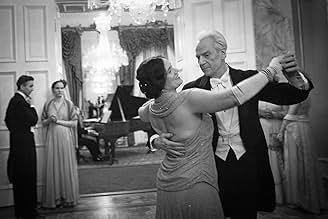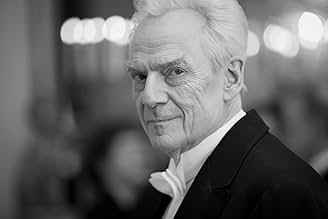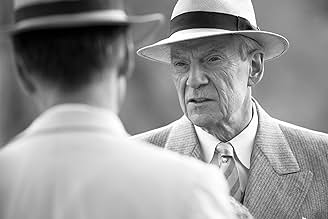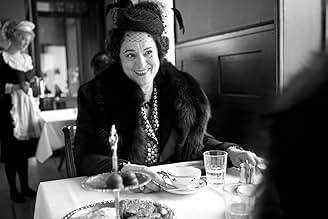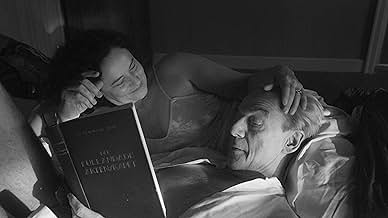अपनी भाषा में प्लॉट जोड़ेंA story based on the life of journalist Torgny Segerstedt, who alerted the Swedish public to the threat of Fascism in the 1930s.A story based on the life of journalist Torgny Segerstedt, who alerted the Swedish public to the threat of Fascism in the 1930s.A story based on the life of journalist Torgny Segerstedt, who alerted the Swedish public to the threat of Fascism in the 1930s.
- निर्देशक
- लेखक
- स्टार
- पुरस्कार
- 3 जीत और कुल 7 नामांकन
फ़ीचर्ड समीक्षाएं
The key to this film lies, in part, in understanding the meaning of the title. "The Last Sentence" is an ambiguous translation of the Swedish because a "last sentence" might refer to the last words a man writes. Instead, "sentence" here means the "judgment" one passes on a man who has died--a judgment that endures longer than the judgments that were passed on a man while he was alive.
And this citation of the "Hávamál" (an Old Norse 13th-century poem) has a special resonance in light of a toast proposed by Torgny Segerstedt early in the film: Segerstedt remarks something to the effect that we have a sacred duty to tell the truth in public matters, but no such duty in our private affairs.
Jan Troell has thus given us a portrait of Torgny Segerstedt as a man who fiercely refused to say anything other than the truth about Hitler and Nazism, but who, at the same time, was incapable of acting in a truthful and caring fashion in his private life--a man who seemingly had a deeper attachment to his dogs than to any of the people who deeply loved him.
And Troell has perhaps highlighted the shortcomings in Segerstedt's personal relationships precisely because he wants the viewer to sense this tension in the final judgment we place on the life of a man. Do Segerstedt's attempts to stir the conscience of the Swedes through his writings on the horrors of Nazism cancel out whatever negative judgment we might pass on his conduct as a father, husband or lover?
Maybe Troell poses just such a question because he himself may sense that he's nearing the end of his own life. And so what Troell wants, perhaps, is for us to realize that we are all faced with the question of the measure of a person's life and the final judgment to be passed on that life: what weight to give to the life one has lived in public, visible to all, or to the life that one has lived in the shadows (filled with love and affection or not) of one's private life?
And this citation of the "Hávamál" (an Old Norse 13th-century poem) has a special resonance in light of a toast proposed by Torgny Segerstedt early in the film: Segerstedt remarks something to the effect that we have a sacred duty to tell the truth in public matters, but no such duty in our private affairs.
Jan Troell has thus given us a portrait of Torgny Segerstedt as a man who fiercely refused to say anything other than the truth about Hitler and Nazism, but who, at the same time, was incapable of acting in a truthful and caring fashion in his private life--a man who seemingly had a deeper attachment to his dogs than to any of the people who deeply loved him.
And Troell has perhaps highlighted the shortcomings in Segerstedt's personal relationships precisely because he wants the viewer to sense this tension in the final judgment we place on the life of a man. Do Segerstedt's attempts to stir the conscience of the Swedes through his writings on the horrors of Nazism cancel out whatever negative judgment we might pass on his conduct as a father, husband or lover?
Maybe Troell poses just such a question because he himself may sense that he's nearing the end of his own life. And so what Troell wants, perhaps, is for us to realize that we are all faced with the question of the measure of a person's life and the final judgment to be passed on that life: what weight to give to the life one has lived in public, visible to all, or to the life that one has lived in the shadows (filled with love and affection or not) of one's private life?
Jan Troell is the nestor of Swedish films. He's been directing for 50 years and bringing on Torgny Segerstedt is of course an interesting choice of subject. Segerstedt was one of few journalists who completely stood up against Hitler during WW2. A story of courage in a special way, since Sweden never took part in the war.
So this could have been a discussion about common political morals, but instead it's a discussion about Segerstedt's private life and most of all his mistresses. Of course you can make a movie that way, if it has a substance referring to the man's work, but this isn't the case here. It's more about anybody's love life.
And there isn't any magic about it. The work should be bigger than the man than it comes to somebody like Segerstedt.
So this could have been a discussion about common political morals, but instead it's a discussion about Segerstedt's private life and most of all his mistresses. Of course you can make a movie that way, if it has a substance referring to the man's work, but this isn't the case here. It's more about anybody's love life.
And there isn't any magic about it. The work should be bigger than the man than it comes to somebody like Segerstedt.
I loved this movie.
I couldn't disagree more with the two previous reviewers. I almost wondered whether they had been watching the same film. The pace of Troell's film allows you time to reflect as the story develops.
No, it's not Raiders of the Lost Ark nor is it in colour, but it is a thoughtful, beautifully made film which stays in your mind long after you have left the cinema.
And I'm not alone in rating this film. Most of the other reviews have praised the quality of the script, the camera-work and the way Troell manages to get such amazing performances from his actors.
In my opinion, a must-see.
I couldn't disagree more with the two previous reviewers. I almost wondered whether they had been watching the same film. The pace of Troell's film allows you time to reflect as the story develops.
No, it's not Raiders of the Lost Ark nor is it in colour, but it is a thoughtful, beautifully made film which stays in your mind long after you have left the cinema.
And I'm not alone in rating this film. Most of the other reviews have praised the quality of the script, the camera-work and the way Troell manages to get such amazing performances from his actors.
In my opinion, a must-see.
''The Last Sentence'' (original title in Swedish- ''Dom över död man'') is the story of Torgny Segerstedt, a Swedish journalist whose fierce anti-nazi articles became a matter of great concern within the country's political life and stirred major backlash both in Germany and Sweden. The movie begins with Adolph Hitler's rise to absolute power in Germany in mid-1930s and follows the growing aggressiveness and hate-speech of the Third Reich until the ending of the Second World War, examining the influence and effect that the threat of a possible German invasion had on the decision-making of Sweden's government. The film focuses on the much-debated neutrality of Sweden and Segerstedt's bold critique on the inactivity of Swedish politicians even when Nazis invaded the neighboring Scandinavian countries. The basic flaw of ''The Last Sentence'' is that it follows an uneven rhythm and as a result, the movie can be divided into two parts, the first being tedious, almost annoying, while the second picks up speed and leads to an emotionally touching climax. The director, Jan Troell, is one of Sweden's greatest auteurs and each one of his films is characterized by its high-quality standards as well as magnificent performances. In this one, I think that Jesper Christensen's performance deserves to be in the spotlight but the whole of the cast does a tremendous job as well. My rating would be closer to 3,5/5.
Personal courage becomes a scarce commodity when the times get tough. And there weren't times much tougher than 1930's and the rise of Nazism. Europe stood paralyzed in an unlikely marriage of fear and denial. Veteran director Jan Troell tells a story of a public figure that bravely attacked Nazis in his newspaper column. Torgny Segerstedt was revered and much suspected. His principals made the others look corrupt and petty. And they were, but that is beside the point, because nobody has more concern about appearances than the immoral and tainted. The interesting quirk of this brilliant movie is that Torgny himself was a deeply flawed human being, in turns neglectful and cruel to his wife and kids. Somehow this man with such strong sense of morals, cared about the humanity in general, but alas, not for individuals. Well, that might be understandable. The messiness of humanity would try the patience off all saints combined. Our times prove that beyond any doubt.
क्या आपको पता है
- ट्रिवियाThis is the second movie in which Jesper Christensen and Pernilla August are parts in a wife-husband-mistress triangle. Here Pernilla August is the mistress, in Drabet (2005) she was the wife.
- गूफ़In the movie at a party which is supposed to take place 1938 the swedish song "Hur har du det med kärleken idag?" is played and also sung by the character Maja Forssman. This song is from 1945 and was then made popular by the famous swedish artist Ulla Billquist.
- साउंडट्रैकFinlandia
Written by [nm=0006292]
टॉप पसंद
रेटिंग देने के लिए साइन-इन करें और वैयक्तिकृत सुझावों के लिए वॉचलिस्ट करें
विवरण
- रिलीज़ की तारीख़
- कंट्री ऑफ़ ओरिजिन
- भाषाएं
- इस रूप में भी जाना जाता है
- The Last Sentence
- फ़िल्माने की जगहें
- उत्पादन कंपनियां
- IMDbPro पर और कंपनी क्रेडिट देखें
बॉक्स ऑफ़िस
- US और कनाडा में सकल
- $62,506
- US और कनाडा में पहले सप्ताह में कुल कमाई
- $9,020
- 22 जून 2014
- दुनिया भर में सकल
- $3,28,005
- चलने की अवधि2 घंटे 6 मिनट
- रंग
- पक्ष अनुपात
- 1.78 : 1
इस पेज में योगदान दें
किसी बदलाव का सुझाव दें या अनुपलब्ध कॉन्टेंट जोड़ें



